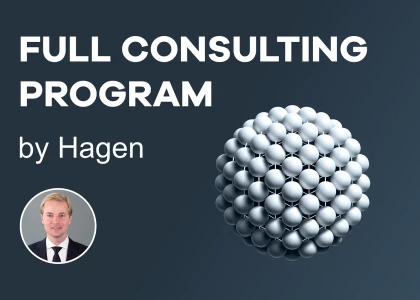Hi,
May I know what is a due diligence case in the sense of what is expected and what makes it tough?
I would also like to understand why do some/most consultants would like to avoid being staffed on DD type of cases?
Hi,
May I know what is a due diligence case in the sense of what is expected and what makes it tough?
I would also like to understand why do some/most consultants would like to avoid being staffed on DD type of cases?


Hi there,
This is indeed an interesting question which is probably relevant for quite a lot of users, so I am happy to provide my perspective on it:
In case you want a more detailed discussion on Bain's private equity work, please feel free to contact me directly.
I hope this helps,
Hagen

You will be supporting an investor decision on whether to buy or not a company, usually by providing an assessment on the market that will be translated into the investment business plan (i.e., help provide specific lines on the business plan usually related to growth, segmentation, margin targets, etc.) also providing supporting evidence (research, expert interviews) and qualitative support.
The objective may not only be to assess the market where the company currently is, but actually to support the investment thesis (e.g. can they successfully expand to segment X, or market Y?) and assess key market risks (how much market share is at risk if xyz happens)?
You may also be working to calculate potential synergies (and one again, try to find evidence to support any assumptions made in the business model).
The work is, in my opinion, quite exciting and intellectually challenging. You have to learn a lot about a new market very fast, and you learn a lot about business models and how value is created.
Regarding skillset, you need a spike on analytical and structuring capability for this (and a good degree of authonomy). But client management skills don't need to be as sharp.
The downside is that projects are usually 3 week long given the time alloted in the deal process by the sellers. So you need to be super fast on everything. Is very very intensive, with long hours and a lot of crunch time, and you work from the office.
So these are the 4 differences vs. regular project work: longer hours, short project, no travelling, limited client interaction.

Many consultants avoid due diligence studies as there is no work-life balance and usually very limited client interaction.
You work very intensely for a few weeks under huge time pressure. If you are interested in private equity, it can be a great learning opportunity.

Hello!
I did multiple commercial DDs with McKinsey, all M&A, and were by far the taughest projects that I did.
The pressure with the clients was incredibly high since the stakes when buying and selling are very high. Furthermore, timelines are just crazy, we worked most weekends and late nights.
On the other hands, the topics and process are fascinating, but the amount of work is just insane.
Hope it helps!
Cheers,
Clara

Hi there,
It's essentially doing all of the research for a company to decide (finalize) an acquisition/merger.
They're extremely time-sensitive (a deal is pending) and high stakes (lots of $$ and big-time company-changing moves). As such, you have just a few weeks to fully understand the two companies, how they work together, what the value of of the M&A etc.
It's basically a super condensed case and exhausting! The plus side is you learn a ton.

One of those case types that consultants either love or hate.
Pros
+ Great opportunity to learn about an industry very rapidly
+ Never boring, given short duration (avg 2-3 weeks) + high pace
+ Hones basic consulting skillset (though less client engagement)
Cons
- Very intense working mode + long hours (that’s why people often avoid)
- Time pressure (typically harder to cope for new joiners)
- Gets repetitive once you’ve done a handful











